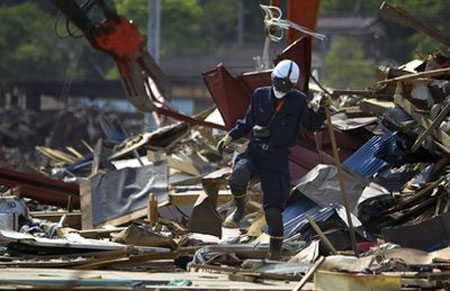The Japanese seabed moved 24 m because of the earthquake
The historic earthquake in Japan on March 11 caused the sea floor to move up to 24 meters in the direction from east to west.
National Geographic said that Mariko Sato, a Japanese coastguard scientist, and colleagues set up ultrasonic transmitters at several points along the milling line that caused the earthquake on March 11. Thanks to ultrasound, they can measure the position from devices to ships. The location of the ships is determined by satellite.
A few days after the earthquake in March, the team returned to the sea to measure changes in the location of broadcast devices. They found that they all moved away from the original position in the direction from east to west. The farthest distance is up to 24 m. This is the largest distance shifted by earthquakes that humans have ever measured.

A policeman walked through the ruins in Kesennuma City, Miyagi Prefecture
Japan on 19/5. Kesennuma is one of the cities destroyed
heaviest by the earthquake on March 11. Photo : AP.
Chris Goldfinger, a geological expert at the University of Oregon in the US, said every seismic intensity of 9 or more Richter levels could cause the ground or sea floor to move to that level. For example, the 2004 Indian Ocean tsunami earthquake could move the sea floor to 30 m. However, this is the first time scientists have observed seismic impact at the bottom of the sea.
Earlier, US and Japanese geologists discovered many areas along the 2.4 m Japanese coastline by an earthquake on March 11.The Italian National Geological and Volcanic Institute said the Earth's axis moved about 10 centimeters by the earthquake in Japan.
Richard Gross, a researcher at the US Aeronautics Agency (NASA), calculates that the earthquake causes the Earth's rotation speed to increase by 1.6 milliseconds, meaning the time of a day falls by 1, 6 milliseconds.
Sato identified his findings as important for future tsunami studies.
" Continuing to monitor the movement of the seabed to assess the risks of future earthquakes and tsunamis is important work , " he commented.
- Seabed survey in the earthquake area in Japan
- Announcing the cause of Japanese 2011 earthquake super
- Greece: earthquake earthquake!
- Mount Everest moved after Nepal earthquake
- Russian territory moved 4cm because of the Japanese earthquake
- Japan studied the origin of earthquakes
- Japan was again shaken by the second earthquake
- Tokyo shakes because of the earthquake
- Nearly 250 people were injured by earthquakes in Pakistan
- Japan again shook because of the 6.1-magnitude earthquake
- The earthquake island in Pakistan is about to disappear
- The magnitude of the magnitude 5.9 earthquake shook Fukushima
 Is the magnetic North Pole shift dangerous to humanity?
Is the magnetic North Pole shift dangerous to humanity? Washington legalizes the recycling of human bodies into fertilizer
Washington legalizes the recycling of human bodies into fertilizer Lightning stone - the mysterious guest
Lightning stone - the mysterious guest Stunned by the mysterious sunset, strange appearance
Stunned by the mysterious sunset, strange appearance